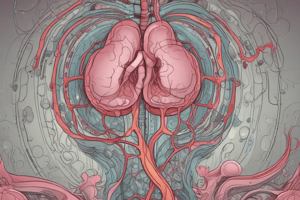Podcast
Questions and Answers
Which of the following is a metabolic waste removed by the kidneys?
Which of the following is a metabolic waste removed by the kidneys?
- Glucose
- Vitamin D
- Urea (correct)
- Protein
What hormone stimulates red blood cell production?
What hormone stimulates red blood cell production?
Erythropoietin
Antidiuretic hormone (ADH) increases urine output.
Antidiuretic hormone (ADH) increases urine output.
False (B)
What is the best measure of kidney filtration efficiency?
What is the best measure of kidney filtration efficiency?
What does an increase in aldosterone lead to?
What does an increase in aldosterone lead to?
The kidneys help maintain the body's acid-base balance by excreting excess _______.
The kidneys help maintain the body's acid-base balance by excreting excess _______.
What condition involves fluid-filled cysts in the kidney tissue?
What condition involves fluid-filled cysts in the kidney tissue?
Which of the following is a symptom of acute glomerulonephritis?
Which of the following is a symptom of acute glomerulonephritis?
Hyperkalemia refers to a deficiency of potassium.
Hyperkalemia refers to a deficiency of potassium.
What measurement assesses how well kidneys are clearing creatinine?
What measurement assesses how well kidneys are clearing creatinine?
Flashcards are hidden until you start studying
Study Notes
Kidney Function
- Filtration: Eliminates metabolic wastes such as urea, uric acid, ammonia, and creatinine, along with drugs and foreign substances from the bloodstream.
- Reabsorption: Balances water and electrolytes and maintains acid-base levels by excreting hydrogen ions and reabsorbing bicarbonate.
- Secretion: Produces erythropoietin for red blood cell production, activates vitamin D for calcium absorption, and secretes renin to regulate blood pressure via the RAAS.
Hormones Involved in Kidney Function
- Antidiuretic Hormone (ADH):
- Produced by posterior pituitary.
- Responsible for water reabsorption; high levels result in concentrated urine, while low levels lead to dilute urine.
- Aldosterone:
- Secreted by the adrenal cortex.
- Regulates sodium and water reabsorption to control fluid balance.
Renal Blood Flow and GFR
- Glomerular Filtration Rate (GFR):
- Key measure of kidney function, indicating renal blood filtration per time unit.
- GFR over 90 mL/min suggests good kidney function; below 60 mL/min indicates diminished function.
- Blood pressure is closely linked to kidney health.
Renin-Angiotensin-Aldosterone System (RAAS)
- Activated by decreased kidney perfusion or low sodium levels.
- Renin initiates the conversion of angiotensin to its active forms:
- Angiotensin causes vasoconstriction, raising blood pressure.
- Aldosterone promotes sodium and water reabsorption, thereby increasing blood volume and pressure.
Key Lab Indicators of Kidney Function
- GFR: Best indicator of kidney filtration effectiveness.
- Urine Creatinine Clearance (CrCl): Measures kidney's ability to clear creatinine.
- Serum Creatinine: Elevated levels indicate impaired kidney function.
- Blood Urea Nitrogen (BUN): Assesses nitrogen waste in the blood.
Kidney Dysfunction
- Results in metabolic waste accumulation, leading to uremia, anemia, and cognitive disturbances.
- Decreased urine production leads to oliguria or anuria.
- Imbalances include:
- Hyperkalemia: Excess potassium linked to cardiac risks.
- Metabolic acidosis: Inefficient H+ ion excretion.
- Reduced erythropoietin leads to anemia; decreased vitamin D activation causes hypocalcemia.
Common Renal Diseases
- Pyelonephritis:
- Kidney infection primarily caused by E. coli.
- Symptoms include flank pain, fever, chills, nausea, vomiting, and hematuria.
- Acute Glomerulonephritis (AG):
- Often follows streptococcal infections, results in edema, oliguria, dark hematuria, and proteinuria.
- Nephrotic Syndrome:
- Glomerular damage often due to diabetes, causing proteinuria, edema, and hypoalbuminemia, similar to AG.
- Polycystic Kidney Disease (PKD):
- Genetic condition leading to cyst formation in kidneys, resulting in impaired function and hypertension.
- Symptoms include pain from cyst pressure, kidney stones, and hematuria.
Acute Kidney Injury
- Characterized by a rapid decline in kidney function, affecting waste excretion and fluid balance, leading to potential systemic complications.
Studying That Suits You
Use AI to generate personalized quizzes and flashcards to suit your learning preferences.



![[PPT] Urinary and Renal Disorders](https://assets.quizgecko.com/cdn-cgi/image/width=300,height=200,fit=crop,quality=75,format=webp/quiz/e3147ee7c05bc213f1834c6d9ce58e42.jpg)
